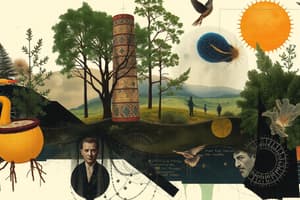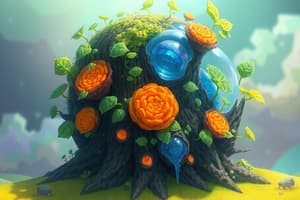Podcast
Questions and Answers
What is the primary component that distinguishes terrestrial ecosystems from freshwater ecosystems?
What is the primary component that distinguishes terrestrial ecosystems from freshwater ecosystems?
Which organelle is responsible for generating energy for the cell through the process of cellular respiration?
Which organelle is responsible for generating energy for the cell through the process of cellular respiration?
What is the term for the physical characteristics of an organism, such as eye color or height, that are determined by its genes?
What is the term for the physical characteristics of an organism, such as eye color or height, that are determined by its genes?
What is the process by which one species gives rise to a new species?
What is the process by which one species gives rise to a new species?
Signup and view all the answers
What is the function of the roots of a plant?
What is the function of the roots of a plant?
Signup and view all the answers
What is the term for the movement of water through a plant, from the roots to the leaves, and is then released into the air as water vapor?
What is the term for the movement of water through a plant, from the roots to the leaves, and is then released into the air as water vapor?
Signup and view all the answers
What is the term for the 'building blocks of life' that make up all living organisms?
What is the term for the 'building blocks of life' that make up all living organisms?
Signup and view all the answers
What is the process by which cells become specialized to perform specific functions?
What is the process by which cells become specialized to perform specific functions?
Signup and view all the answers
What is the term for the study of the structure, function, and behavior of cells?
What is the term for the study of the structure, function, and behavior of cells?
Signup and view all the answers
What is the term for the scientific study of the characteristics of an organism that are inherited from its parents?
What is the term for the scientific study of the characteristics of an organism that are inherited from its parents?
Signup and view all the answers
Study Notes
जीव विज्ञान (Biology)
Ecosystem
- Definition: A community of living organisms (biotic factors) interacting with non-living components (abiotic factors) in a specific environment.
- Components:
- Biotic factors: plants, animals, microorganisms
- Abiotic factors: light, temperature, water, soil, air
- Types of ecosystems:
- Terrestrial (land-based)
- Freshwater
- Marine
- Arctic/Antarctic
Cell Biology
- Definition: The study of the structure, function, and behavior of cells.
- Cell structure:
- Plasma membrane
- Cytoplasm
- Nucleus
- Mitochondria
- Endoplasmic reticulum
- Cellular processes:
- Metabolism
- Photosynthesis
- Respiration
- Cell division (mitosis, meiosis)
Genetics
- Definition: The study of heredity and variation in organisms.
- Key concepts:
- DNA (deoxyribonucleic acid)
- Genes
- Traits
- Inheritance patterns (Mendelian laws)
- Genetic variation (mutations, genetic drift)
Evolution
- Definition: The change in the characteristics of a species over time.
- Mechanisms:
- Natural selection
- Genetic drift
- Gene flow
- Mutation
- Evidence for evolution:
- Fossil record
- Comparative anatomy
- Molecular biology (DNA, protein sequences)
Botany
- Definition: The study of plants, including their structure, growth, evolution, classification, and distribution.
- Plant structure:
- Roots
- Stems
- Leaves
- Flowers
- Fruits
- Plant functions:
- Photosynthesis
- Respiration
- Transpiration
- Nutrient uptake
- Plant classification:
- Kingdoms (Monera, Protista, Fungi, Plantae)
- Divisions (Angiosperms, Gymnosperms)
जीव विज्ञान (Biology)
Ecosystem
- Ecosystem is a community of living organisms (biotic factors) interacting with non-living components (abiotic factors) in a specific environment.
- Biotic factors include plants, animals, and microorganisms.
- Abiotic factors include light, temperature, water, soil, and air.
- There are four types of ecosystems: terrestrial (land-based), freshwater, marine, and Arctic/Antarctic.
Cell Biology
- Cell biology is the study of the structure, function, and behavior of cells.
- The cell structure consists of plasma membrane, cytoplasm, nucleus, mitochondria, and endoplasmic reticulum.
- Cellular processes include metabolism, photosynthesis, respiration, and cell division (mitosis, meiosis).
Genetics
- Genetics is the study of heredity and variation in organisms.
- DNA (deoxyribonucleic acid) is the genetic material that carries information from one generation to the next.
- Genes are the basic units of heredity that carry information from one generation to the next.
- Traits are the characteristics of an organism that are determined by genes.
- Inheritance patterns are governed by Mendelian laws.
- Genetic variation occurs due to mutations, genetic drift, and gene flow.
Evolution
- Evolution is the change in the characteristics of a species over time.
- Mechanisms of evolution include natural selection, genetic drift, gene flow, and mutation.
- Evidence for evolution includes fossil record, comparative anatomy, and molecular biology (DNA, protein sequences).
Botany
- Botany is the study of plants, including their structure, growth, evolution, classification, and distribution.
- Plant structure consists of roots, stems, leaves, flowers, and fruits.
- Plant functions include photosynthesis, respiration, transpiration, and nutrient uptake.
- Plants are classified into kingdoms (Monera, Protista, Fungi, Plantae) and divisions (Angiosperms, Gymnosperms).
Studying That Suits You
Use AI to generate personalized quizzes and flashcards to suit your learning preferences.
Description
Test your knowledge of ecosystems, including biotic and abiotic factors, and cell biology concepts like cell structure and function.




